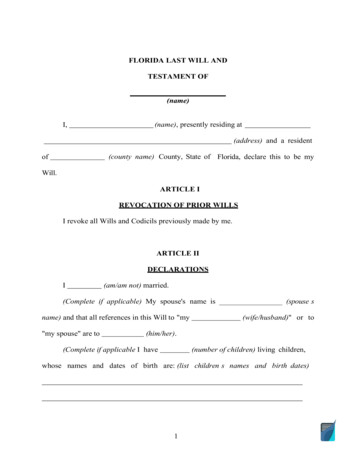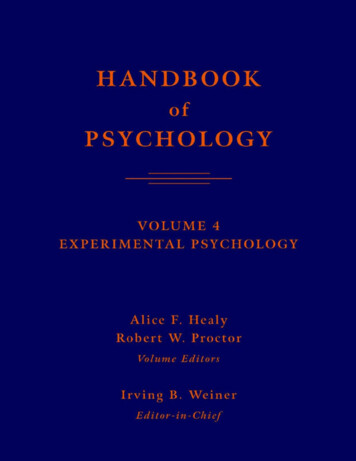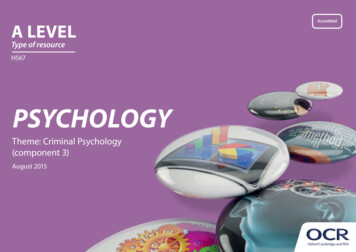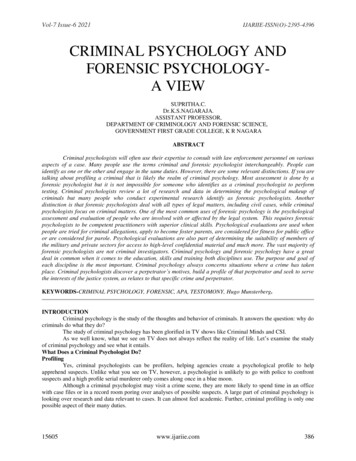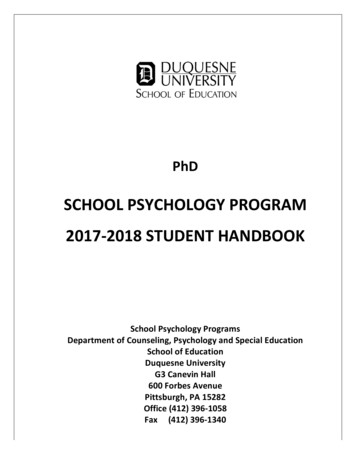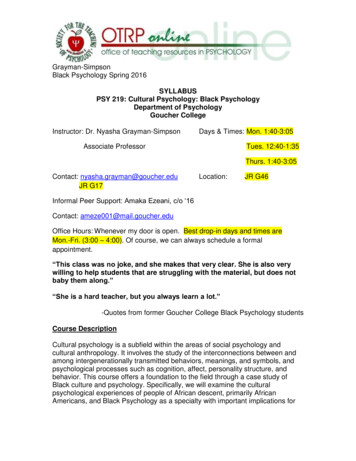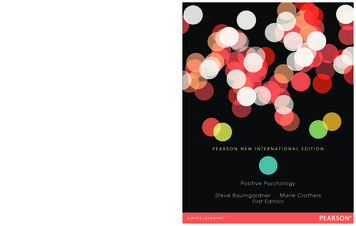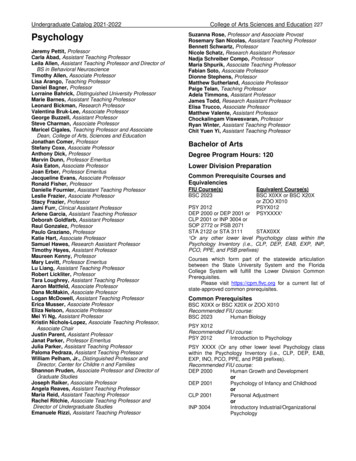
Transcription
Undergraduate Catalog 2021-2022PsychologyJeremy Pettit, ProfessorCarla Abad, Assistant Teaching ProfessorLeila Allen, Assistant Teaching Professor and Director ofBS in Behavioral NeuroscienceTimothy Allen, Associate ProfessorLisa Arango, Teaching ProfessorDaniel Bagner, ProfessorLorraine Bahrick, Distinguished University ProfessorMarie Barnes, Assistant Teaching ProfessorLeonard Bickman, Research ProfessorValentina Bruk-Lee, Associate ProfessorGeorge Buzzell, Assistant ProfessorSteve Charman, Associate ProfessorMaricel Cigales, Teaching Professor and AssociateDean, College of Arts, Sciences and EducationJonathan Comer, ProfessorStefany Coxe, Associate ProfessorAnthony Dick, ProfessorMarvin Dunn, Professor EmeritusAsia Eaton, Associate ProfessorJoan Erber, Professor EmeritusJacqueline Evans, Associate ProfessorRonald Fisher, ProfessorDanielle Fournier, Assistant Teaching ProfessorLeslie Frazier, Associate ProfessorStacy Frazier, ProfessorJami Furr, Clinical Assistant ProfessorArlene Garcia, Assistant Teaching ProfessorDeborah Goldfarb, Assistant ProfessorRaul Gonzalez, ProfessorPaulo Graziano, ProfessorKatie Hart, Associate ProfessorSamuel Hawes, Research Assistant ProfessorTimothy Hayes, Assistant ProfessorMaureen Kenny, ProfessorMary Levitt, Professor EmeritusLu Liang, Assistant Teaching ProfessorRobert Lickliter, ProfessorTara Loughrey, Assistant Teaching ProfessorAaron Mattfeld, Associate ProfessorDana McMakin, Associate ProfessorLogan McDowell, Assistant Teaching ProfessorErica Musser, Associate ProfessorEliza Nelson, Associate ProfessorMei Yi Ng, Assistant ProfessorKristin Nichols-Lopez, Associate Teaching Professor,Associate ChairJustin Parent, Assistant ProfessorJanat Parker, Professor EmeritusJulia Parker, Assistant Teaching ProfessorPaloma Pedraza, Assistant Teaching ProfessorWilliam Pelham, Jr., Distinguished Professor andDirector, Center for Childre n and FamiliesShannon Pruden, Associate Professor and Director ofGraduate StudiesJoseph Raiker, Associate ProfessorAngela Reaves, Assistant Teaching ProfessorMaria Reid, Assistant Teaching ProfessorRachel Ritchie, Associate Teaching Professor andDirector of Undergraduate StudiesEmanuele Rizzi, Assistant Teaching ProfessorCollege of Arts Sciences and Education 227Suzanna Rose, Professor and Associate ProvostRosemary San Nicolas, Assistant Teaching ProfessorBennett Schwartz, ProfessorNicole Schatz, Research Assistant ProfessorNadja Schreiber Compo, ProfessorMaria Shpurik, Associate Teaching ProfessorFabian Soto, Associate ProfessorDionne Stephens, ProfessorMatthew Sutherland, Associate ProfessorPaige Telan, Teaching ProfessorAdela Timmons, Assistant ProfessorJames Todd, Research Assistant ProfessorElisa Trucco, Associate ProfessorMatthew Valente, Assistant ProfessorChockalingam Viswesvaran, ProfessorRyan Winter, Assistant Teaching ProfessorChit Yuen Yi, Assistant Teaching ProfessorBachelor of ArtsDegree Program Hours: 120Lower Division PreparationCommon Prerequisite Courses andEquivalenciesFIU Course(s)BSC 2023Equivalent Course(s)BSC X0XX or BSC X20Xor ZOO X010PSYX012PSYXXXX¹PSY 2012DEP 2000 or DEP 2001 orCLP 2001 or INP 3004 orSOP 2772 or PSB 2071STA 2122 or STA 3111STAX0XX¹Or any other lower level Psychology class within thePsychology Inventory (i.e., CLP, DEP, EAB, EXP, INP,PCO, PPE, and PSB prefixes)Courses which form part of the statewide articulationbetween the State University System and the FloridaCollege System will fulfill the Lower Division CommonPrerequisites.Please visit https://cpm.flvc.org for a current list ofstate-approved common prerequisites.Common PrerequisitesBSC X0XX or BSC X20X or ZOO X010Recommended FIU course:BSC 2023Human BiologyPSY X012Recommended FIU course:PSY 2012Introduction to PsychologyPSY XXXX (Or any other lower level Psychology classwithin the Psychology Inventory (i.e., CLP, DEP, EAB,EXP, INO, PCO, PPE, and PSB prefixes).Recommended FIU course:DEP 2000Human Growth and DevelopmentorDEP 2001Psychology of Infancy and ChildhoodorCLP 2001Personal AdjustmentorINP 3004Introductory Industrial/OrganizationalPsychology
228 College of Arts Sciences and EducationSOP 2772orPsychology of Sexual BehaviororPSB 2071 Cognitive Neuroscience inthe Media and Pop CultureSTA XXXXRecommended FIU course:STA 2122Statistics for Behavioral and SocialSciences IorSTA 3111Statistics IStudents admitted to the university are admitted directly totheir chosen major. Students are expected to make goodprogress based on critical indicators, such as GPA inspecific courses or credits earned. In cases wherestudents are not making good progress, a change of majormay be required. Advisors work to redirect students tomore appropriate majors when critical indicators are notmet.Upper Division ProgramCoursework for the Major: 36 credit hours are required(grade of “C” or better required). Students must completethe Research Sequence (10 credits), fulfill the AreaRequirements (15 credits), and the Psychology ElectiveRequirements (9 credits) and successfully complete theCareers in Psychology Course (2 credits)1. Research Sequence: (10 credit hours total). Studentsmust take these three courses in the following order.A. PSY 3211 Research Methods and Data Analysisin Psychology I (3 credits) (Prerequisite: STA2122)B. PSY 3215 Research Methods and Data Analysisin Psychology II (4 credits) (Prerequisites:Research Methods and Data Analysis inPsychology I)C. PSY 4931 Senior Seminar in Psychology (3credits) (Prerequisites: Research Methods inPsychology II or Research Methods inPsychology)OrEAB 4795 Senior Seminar in Applied BehaviorAnalysis (3 Credits) (Prerequisites: ResearchMethods in Psychology or Research Methodsand Data Analysis in Psychology II, and AppliedBehavior Analysis: Assessment and Intervention)Note: Because the three courses in thiscomponent of the program must be taken insequence, it is recommended that the first courseshould be taken no later than the first semester ofthe sophomore year.2. Area Requirement Courses: (15 semester hours)Students are required to take one course from each area.Area A: Cognitive/NeuroscienceEXP 3523Memory and Memory ImprovementEXP 4204Sensation and PerceptionEXP 4604Cognitive ProcessesPSB 3002Introductory Bio-PsychologyPSB 4240NeuropsychologyPSB 4250Animal CognitionArea B: SocialUndergraduate Catalog 2021-2022SOP 3004SOP 3015SOP 3742SOP 4414SOP 4731Introductory Social PsychologySocial and Personality DevelopmentPsychology of WomenAttitudes and Social BehaviorGlobal Psychology: Cross CulturalPerspectives on PsychologicalResearch and Theories – GLArea C: AppliedCYP 3003Introduction to Community PsychologyEAB 3002Introduction to the ExperimentalAnalysis of BehaviorEAB 3794Principles of Applied BehaviorAnalysisINP 4203Personnel PsychologyINP 4313Organizational PsychologyPSY 4302Psychological TestingSOP 4842Legal PsychologyArea D: Clinical/PersonalityCLP 4134Childhood PsychopathologyCLP 4146PsychopathologyCLP 4314Psychology of Health and Illness – GLCLP 4374PsychotherapyEAB 4764Applied Behavior Analysis: Assessmentand InterventionPPE 3003Theories of PersonalityArea E: DevelopmentalDEP 3115Development in Infancy: The Basis ofHuman KnowledgeDEP 3305Psychology of AdolescenceDEP 3404Psychology of AdulthoodDEP 4164Children's LearningDEP 4464Psychology of Aging3. Psychology Elective Requirements: (9 credit hours)Any psychology course taken for a letter grade can beused to fulfill the requirement for electives. These coursesmust be upper level (3000 or 4000) courses. Studentsmust have at least 36 credits hours in total of upperdivision hours for the psychology major. Students may,with the permission of the instructor, enroll in PSY 4916Independent Research in Psychology, or PSY 4914Honors Research Project, or PSY 4941 ExperientialLearning/Internship in Psychology, or PSY 4XXXResearch Internship in Psychological Science which aregiven pass/fail grades. A maximum of 6 credits of PSY4916, PSY 4914, PSY 4941, and /or PSY 4XXX PSY canbe used to satisfy Psychology Elective Requirements.4. Careers Course Requirement: Students are requiredto take PSY 3024: Psychology Career Development.5. General Electives: The College of Arts, Sciences andEducation requires that, in the last 60 semester hours ofenrollment, students must earn at least nine semesterhours through coursework outside the major department.These courses can be either lower division or upperdivision courses.Students may, with the permission of the instructor, takePSY 4900 and PSY 4914, which are given Pass/Failgrades. These courses cannot count in the category ofPsychology Elective Requirements, but they can be usedas additional credit towards graduation.Please Note: (1) Students are strongly urged to contacttheir academic advisor in the Psychology Department for
Undergraduate Catalog 2021-2022advisement in curriculum planning; (2) Psychology majorsare allowed to transfer a maximum of eighteen semesterhours in upper division psychology courses. Coursesubstitutions may be approved by the Director ofUndergraduate Studies.Bachelor's Degree with HonorsApplication must be made, and departmental approvalgranted, to undertake an independent project which mustbe approved by and carried out under the supervision of afull-time faculty member of the Department. Uponcompletion of an independent project, a satisfactory oraldefense of the work must be presented to a Departmentcommittee, of at least two members.Note: The Bachelor’s degree offered in this program is aliberal arts degree and not a professional degree. While itis possible to concentrate courses in one’s area ofinterest, it is not possible at the present time to obtain a‘professional specialization’ at the undergraduate level inpsychology.B.S. in Behavioral NeuroscienceDegree Program Hours: 120The B.S. in Behavioral Neuroscience degree programprovides a rigorous undergraduate education with anemphasis in science-based behavioral neuroscience,systems, and clinical neuroscience, neuroplasticity, mentalhealth disorders, research methodology, statistics, anddata analysis, in addition to foundational STEM coursesneeded to fulfill the competitive requirements of the fastestgrowing career sectors for medical and science-basedprofessional career paths.Students graduating from Behavioral Neuroscience will becompetitively prepared for a variety of jobs as well asadvanced graduate study in neuroscience, medicine,pharmacology, veterinary medicine, terfacetechnologies, and various areas within psychology.Major Requirements:Behavioral Neuroscience majors must complete 34 credithours (25 credits of core courses and 9 credit hours ofelectives). Students must earn a grade of C or higher in allcourses required for the major.Core Courses (25 Credits)PSB 3007Introduction to Behavioral NeurosciencePSB 3101Introduction to Methods in BehavioralNeurosciencePSB 3823Behavioral NeurosciencePSB 4241Clinical NeurosciencePSB 4200Systems NeurosciencePSY 3211Research Methods and Data Analysisin Psychology IPSY 3215Research Methods and Data Analysisin Psychology IIPSY 4931Senior SeminarElectives within the Major (9 credits)Students must take at least 1 course from Cellular &Molecular, 1 course from Behavioral & Systems, and thelast 3 credits can be from either of these categories orCollege of Arts Sciences and Education 229from lular & Molecular NeurosciencePSB 3504Developmental NeurosciencePSB 4434PsychopharmacologyPSB 4581Behavioral EpigeneticsZOO 4743CNeuroscienceZOO 4744NeurobiologyZOO 4781Sensory Systems in NeurobiologyBehavioral & Systems NeuroscienceEXP 3304Motivation & EmotionEXP 4204Sensation & PerceptionLIN 4705Psychology of Language and CognitionPSB 3461Hormones & BehaviorPSB 4240NeuropsychologyPSB 4250Animal CognitionPSB 4800Neurobiology of Learning & MemoryZOO 4513Animal BehaviorZOO 4513LAnimal Behavior LabOther Behavioral Neuroscience ElectivesPSB 4100Introduction to Programming forNeurosciencePSB 4001History of NeurosciencePSY 4916Independent Research in PsychologyGeneral ElectivesStudents must complete 17 credit hours of electivesoutside the major.CASE Upper-Division ElectivesStudents must complete 9 minimum upper-division credithours outside the major within the last 60 credits in orderto meet the CASE upper division requirements of 45credits.B.A. in Psychology, Applied BehaviorAnalysis TrackThe track in Applied Behavior Analysis (ABA) providescoursework that leads to the Board Certified AssistantBehavior Analyst (BCaBA) certificate. Careers in the fieldof ABA can include working with individuals with autismspectrum disorder and other disabilities, as well as othersseeking assistance to reduce problem behaviors ordevelop skills.Students in this track will learn to define behavior as theunit of study, identify functional relationships betweenbehavior and the environment, observe and measurebehavior objectively and implement behavior analyticinterventions for behavior change.The ABA track consists of the courses below, which havebeen designated as a Verified Course Sequence and meetthe Behavior Analysist Certification Board courseworkrequirements for BCaBA certification. Courses in the trackmay be used to fulfill area requirements for the psychologyBA degree, when applicable.Degree Program Hours: 120EAB 3002EAB 3794EAB 4764Introduction to the ExperimentalAnalysis of BehaviorPrinciples of Applied BehaviorAnalysisApplied Behavior Analysis:
230 College of Arts Sciences and EducationEAB 4798EAB 4795Assessment and InterventionSingle Case Research MethodsSenior Seminar in AppliedBehavior AnalysisUpper Division ProgramCoursework for the Major: 36 credit hours are required(grade of “C” or better required). Students must completethe Research Sequence (10 credits), fulfill the AreaRequirements (15 credits), and the Psychology ElectiveRequirements (9 credits) and successfully complete theCareers in Psychology Course (2 credits)1. Research Sequence: (10 credit hours total). Studentsmust take these three courses in the following order.1. PSY 3211 Research Methods and Data Analysisin Psychology I (3 credits) (Prerequisite: STA2122)2. PSY 3215 Research Methods and Data Analysisin Psychology II (4 credits) (Prerequisites:Research Methods and Data Analysis inPsychology I)3. PSY 4931 Senior Seminar in Psychology (3credits). (Prerequisites: Research Methods inPsychology II or Research Methods inPsychology),Students in the ABA track must instead complete EAB4795, Senior Seminar in Applied Behavior Analysis (3credits). (Prerequisites: Research Methods inPsychology II or Research Methods in Psychologyand EAB 4764)Note: Because the three courses in this component of theprogram must be taken in sequence, it is recommendedthat the first course should be taken no later than the firstsemester of the sophomore year.2. Area Requirement Courses: (15 semester hours)Students are required to take one course from each area.Area A: Cognitive/NeuroscienceEXP 3523Memory and Memory ImprovementEXP 4204Sensation and PerceptionEXP 4604Cognitive ProcessesPSB 3002Introductory Bio-PsychologyPSB 4240NeuropsychologyPSB 4250Animal CognitionArea B: SocialSOP 3004SOP 3015SOP 3742SOP 4414SOP 4731Introductory Social PsychologySocial and Personality DevelopmentPsychology of WomenAttitudes and Social BehaviorGlobal Psychology: Cross CulturalPerspectives on PsychologicalResearch and Theories – GLArea C: AppliedEAB 3002Introduction to the ExperimentalAnalysis of BehaviorEAB 3794Principles of Applied BehaviorAnalysisArea D: Clinical/PersonalityEAB 4764Applied Behavior Analysis: Assessmentand InterventionArea E: DevelopmentalUndergraduate Catalog 2021-2022DEP 3115DEP 3305DEP 3404DEP 4164DEP 4464Development in Infancy: The Basis ofHuman KnowledgePsychology of AdolescencePsychology of AdulthoodChildren's LearningPsychology of Aging3. Psychology Elective Requirements: (9 credit hours)EAB 3002, EAB 3794, and EAB 4764 must be used tofulfill the requirement for electives. Students must have atleast 36 credits hours in total of upper division hours forthe psychology major. Students may, with the permissionof the instructor, enroll in PSY 4916 IndependentResearch in Psychology, or PSY 4914 Honors ResearchProject, or PSY 4941 Experiential Learning/Internship inPsychology, or PSY 4XXX Research Internship inPsychological Science which are given pass/fail grades. Amaximum of 6 credits of PSY 4916, PSY 4914, PSY 4941,and /or PSY 4XXX PSY can be used to satisfy PsychologyElective nal Psychology TrackThis track is for students interested in applying theprinciples of psychology to workplace issues. Studentscompleting this track will be able to work withorganizations in designing selection systems, g/delivering training programs. They will also beable to work with consulting companies that design andmarket selection and training programs. Students will alsobe competent for managing (1) leadership developmentprograms, (2) talent management, especially HighPotential (HIPO) programs and (3) occupational healthand safety initiatives.Degree Program Hours: 120Degree Requirements:1. Have 60 semester hours and have completed theUniversity Core/General Education Requirements orhave an A.A. degree from a FL public institution.2. Must meet the Lower Division preparation CommonPrerequisites courses and equivalencies listed for theB.A. Degree requirements3. Must complete the Research Sequence (10 credits),fulfill the Area Requirements (15 credits), and thePsychology Elective Requirements (9 credits) andsuccessfully complete the Careers in PsychologyCourse (2 credits).4. Must meet the Psychology and General electivesRequirementsUpper Division credits: 60Area Requirement Courses: (15 semester hours)Students are required to take one course from each area.Area A: Cognitive/NeuroscienceEXP 3523Memory and Memory ImprovementEXP 4204Sensation and PerceptionEXP 4604Cognitive ProcessesPSB 3002Introductory Bio-PsychologyPSB 4240Neuropsychology
Undergraduate Catalog 2021-2022PSB 4250SOP 3004SOP 3015SOP 3742SOP 4414SOP 4731Area B: SocialSOP 3004SOP 3015SOP 3742SOP 4414SOP 4731Animal CognitionIntroductory Social PsychologySocial and Personality DevelopmentPsychology of WomenAttitudes and Social BehaviorGlobal Psychology: Cross CulturalPerspectives on PsychologicalResearch and Theories – GLIntroductory Social PsychologySocial and Personality DevelopmentPsychology of WomenAttitudes and Social BehaviorGlobal Psychology: Cross CulturalPerspectives on PsychologicalResearch and Theories – GLArea C: AppliedCYP 3003Introduction to Community PsychologyEAB 3002Introduction to the ExperimentalAnalysis of BehaviorEAB 3794Principles of Applied BehaviorAnalysisINP 4203Personnel PsychologyINP 4313Organizational PsychologyPSY 4302Psychological TestingSOP 4842Legal PsychologyArea D: Clinical/PersonalityCLP 4134Childhood PsychopathologyCLP 4146PsychopathologyCLP 4314Psychology of Health and Illness – GLCLP 4374PsychotherapyEAB 4764Applied Behavior Analysis: Assessmentand InterventionPPE 3003Theories of PersonalityArea E: DevelopmentalDEP 3115Development in Infancy: The Basis ofHuman KnowledgeDEP 3305Psychology of AdolescenceDEP 3404Psychology of AdulthoodDEP 4164Children's LearningDEP 4464Psychology of AgingIndustrial-Organizational Psychology TrackStudents interested in graduating with the IndustrialOrganizational Psychology Track must take:INP 3004Introductory Industrial/OrganizationalPsychologyINP 4203Personnel PsychologyINP 4313Organizational PsychologyPSY 4931SeniorSeminarinIndustrial/Organizational PsychologyAndTake one of the following three courses:PSY 4302Psychological TestingINP 4210Employee SelectionSOP 4745Women and LeadershipMinor in PsychologyA Minor in Psychology requires 15 upper divisionsemester hours of approved psychology credits. Studentsseeking the minor must meet with a psychology facultymember for advisement and should file with theCollege of Arts Sciences and Education 231Psychology Department a written notice of intention tominor in psychology. A grade of ‘C’ or higher is required inall courses counted toward the minor.Combined BA Psychology/ Public HealthPolicy MPH Degree PathwayThe Combined BA/MPH pathwy is designed foroutstanding undergraduate students. It provides a strongbase of knowledge and skills in psychology, and at thesame time accelerates completion of the Master of PublicHealth degree. Students may take advantage of theoverlap of courses in the BA and MPH programs toreceive their MPH degree in a shorter period than it wouldotherwise be possible.Admission RequirementsTo apply, their GPA needs to be significantly aboveaverage (3.25). Students would also be required tomaintain a high GPA (3.0) to remain in the program. Thegrade requirements for an MPH in Health Policy andManagement would apply to courses that are countedtoward the MPH degree. Current enrollment in the Bachelor's degree program inpsychology at FIU. Current GPA of 3.25 or higher. Three letters of recommendation. Approval of the Health Policy and Managementadmissions committee.General RequirementsMeet the requirements of both the BA in Psychology andthe MPH in Health Policy and Management.Four courses (12 credits) will be used to satisfy both theBachelor's in Psychology and the MPH degreerequirements. Students will take the following MPHcourses as electives during their final year in the BAprogram:PHC 6000Epidemiology I: Introduction to PublicHealth Epidemiology3PHC 6065Public Health Statistics3PHC 6102Introduction to Public Health Policy andManagement3PHC 6410Health Behavior and Public Health3Accelerated (4 1 degree) BAPsychology/MPA Degree PathwayinThe MPA program allows qualified students to earn boththeir Bachelor’s and MPA degrees in a shorter amount oftime than typically required for earning degreessequentially. A student admitted to the Accelerated (4 1degree) BA in Psychology/MPA Degree Pathway will beconsidered to have undergraduate status until the studentapplies for graduation from their bachelor’s degreeprogram. Upon conferral of the bachelor’s degree, thestudent will be granted graduate status and be eligible forgraduate assistantships.Students accepted into the Accelerated (4 1 degree) BAin Psychology/MPA Degree Pathway may take up to fourMPA courses, 12 graduate credits, which will be doublecounted for their Bachelor’s and MPA degrees.Admissions Requirements for the Accelerated DegreePathway:
232 College of Arts Sciences and Education1.2.3.4.5.6.The applicant must have an overall GPA of 3.25 orbetter.Letter of recommendation from a faculty member atFIU or from a supervisor.Current resume.Letter-of-intent not to exceed three double-spacedpages explaining how earning the MPA is consistentwith long-term career goals. Students may also usethis letter to discuss their passion for public service orpolicies and to communicate to the admissioncommittee if they feel that their admission file doesnot properly reflect their potential to succeed ingraduate school.Students can apply after having completed 75 creditsin a bachelor’s degree program.Students must apply prior to the semester in whichgraduate credits will be counted towards theirundergraduate degree program.Students admitted into the Accelerated (4 1 degree) BA inPsychology/MPA Degree Pathway should take up to fourcourses from the listed below toward satisfying both theirBachelor’s and MPA degree requirements: PAD 6053: Political, Social and EconomicContext of Public Administration must be takenwithin the first two semesters after a student isaccepted into the Accelerated Degree Pathway. Students may select two of the following coursesto be double counted:o PAD 6227: Public Finance and theBudgetary Processo PAD 6306: Policy Analysis and Planningo PAD 6417: Human Resource Policy andManagemento PAD 6434: Leadership and Decisionmakingo PAD 6701: Quantitative Methods inPublic Administrationo PAD 6726: Applied Research Methodsfor Accountability in Public and NonProfit Organizations (Prerequisite: PAD6701)o PAD 6718: Smart Governance Students may select one additional graduatelevel course to be double counted. The coursemust have a course number of 5000 or higherand have a prefix of PAD, PUP, URP or URS.Students in the Accelerated (4 1 degree) BA inPsychology/MPA Degree Pathway should consulttheir advisor regarding substitutions of the coursesmentioned above for undergraduate courses in theirprogram.Students must pass graduate courses with a grade of B orhigher to count them toward their MPA degree. Studentsaccepted into the Accelerated Degree Pathway must fulfillall the MPA requirements to receive their MPA degree.Course DescriptionsDefinition of PrefixesCBH-Comparative Psychology and Animal Behavior; CLPClinical Psychology; CYP-Community Psychology; DEPDevelopmental Psychology; EAB- Experimental Analysisof Behavior; EXP-Experimental Psychology; INP-IndustrialUndergraduate Catalog 2021-2022and Applied Psychology; LIN- Linguistics; lity; PSB-Psychobiology; PSY-Psychology; SOPSocial PsychologyCourses that meet the University’s Global Learningequirement are identified as GL.CBH 5256 Animal Cognition (3). Survey of comparativecognition between humans and other animals. Majortopics include perception, attention, learning, memory,reasoning, tool use, and language. Prerequisites:Graduate standing or permission of the instructor.CLP 2001 Personal Adjustment (3). Study of personaladjustment in the social and occupational life of theindividual. Emphasis on interpersonal aspects of effectivebehavior.CLP 4134 Childhood Psychopathology (3). Variousforms of abnormal behavior in infancy, childhood, andadolescence are examined within the context of traditionaland contemporary psychological theory. Problems ofdifferential diagnosis and forms of remediation arediscussed.CLP 4146 Psychopathology (3). Various forms ofbehavior pathology are examined in the light of traditionaland current concepts of mental health and illness.Problems of diagnosis and treatment are discussed. Therole of social mores is examined.CLP 4314 Psychology of Health and Illness – GL (3).Course provides an overview of the field of healthpsychology and behavioral medicine with an emphasis onpsychological, social, cultural, and global factors affectinghealth and health care/policy. Prerequisite: PSY 2012.CLP 4374 Psychotherapy (3). Current approaches to thetreatment and improvement of psychological disorders arecritically surveyed. Emphasis is placed on the examinationof the various techniques of psychotherapy and behaviortherapy. Broader strategies of prevention and mentalhealth promotion like consultation, counseling, andprogrammed agency services are also studied.CLP 4444 Personality Disorders (3). Studies personalitydisorders according to current concepts of mental healthand illness. Emphasis given to current theoretical anddiagnostic categories.CLP 5007 Psychological Clinical Science I: HistoricalPerspectives and Current Controversies (3). Thiscourse overviews clinical child psychology, including (a)history and philosophy of psychological clinical scienceand (b) challenges and controversies related to bridgingscience and service. Prerequisite: Graduate standing.CLP 5165 Psychopathology (3). This course will providea comprehensive introduction to the literature onpsychopathology with a focus on understanding itsrelationship to other areas of psychology. Prerequisite:Graduate standing.
Undergraduate Catalog 2021-2022CLP 5166 Advanced Abnormal Psychology (3).Advanced study of the causes, psychopathologymanifestations, and social and personal consequences ofbehavior disturbance. Emphasis is placed on the criticalexamination of current research on the biological,psychological, and social aspects of these disorders.Clinical approaches to diagnosis, course, and prognosis inthe contemporary mental health context (including‘practicum’ assignments if feasible) are ology (3). A comprehensive review of topicsin developmental psychopathology including history,scope, methods, individual and contextual influences,developmental course, long-term outcomes, andresilience. Prerequisites: Graduate standing or permissionof the instructor.CLP 5185 Current Issues in Mental Health (3). A critical,intensive examination of selected, important issues inmental health. Emphasis is given to the empirical study ofcontemporary problems related to the making of mentalpatients; planning, programming, and administeringmental health services; political, ethical, and legalconstraints on the operation of mental health facilities;interdisciplinary cooperation among helping and humanservice professionals; and evaluation of preventive careand treatment services. Prerequisites: AbnormalPsychology or permission of the instructor.CLP 5483 Psychological Clinical Science II: Ecologiesof Development and Theories of Psychopathology (3).This course provides an overview of theories of clinicalchild psychology, including (a) ecologies of developmentas related to psychopathology and (b) theories ofdevelopment psychopathology. Prerequisites: Graduatestanding, CLP 5007.CLP 5931 Ethical Code in Psychological Practice (3).Ethical principles, rules, procedures of Psychologists.Clinical application and incorporation of the principles intoprofessional interactions. Ethical reasoning is emphasized.CYP 3003 Introduction to Community Psychology (3).An introduction to the issues and scope of CommunityPsychology. Students will be exposed to the developmentof Community Psychology as a growing discipline.Particular emphasis will be placed on the role of thecommunity psychologist as an agent of social change.CYP 5534 Groups as Agents of Change (3). Theory andpractice in utilizing groups as agents of change ordevelopment in communities and organizations. Didacticpresentation and structured exercises focus on relevan
FIU Course(s) BSC 2023 PSY 2012 DEP 2000 or DEP 2001 or CLP 2001 or INP 3004 or SOP 2772 or PSB 2071 . PSYXXXX¹ STAX0XX er lower level Psychology class within the Psychology Inventory (i.e., CLP, DEP, EAB, EXP, INP, B prefixes) Courses which form part of the statewide articulation between the State University System and the Florida
